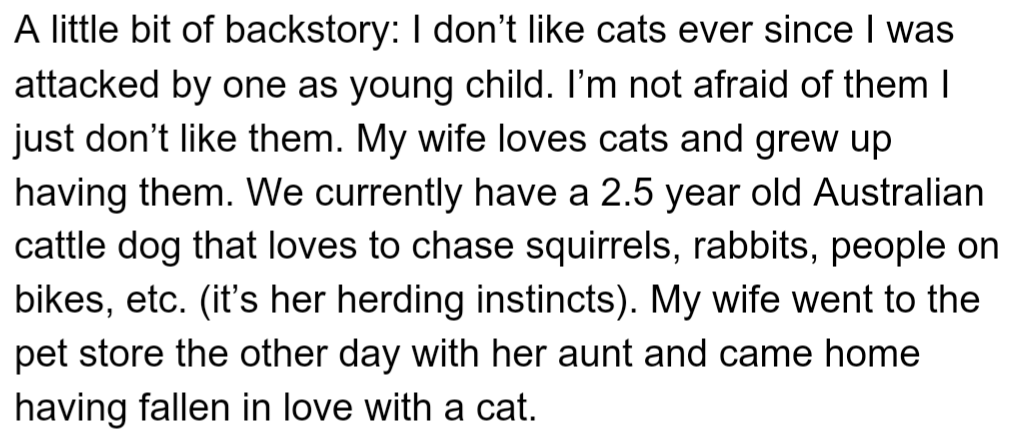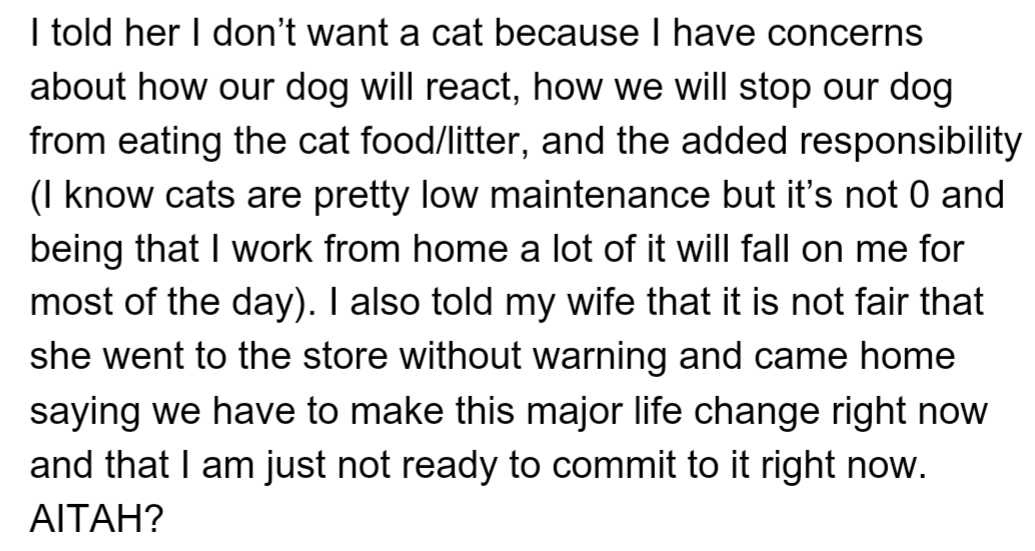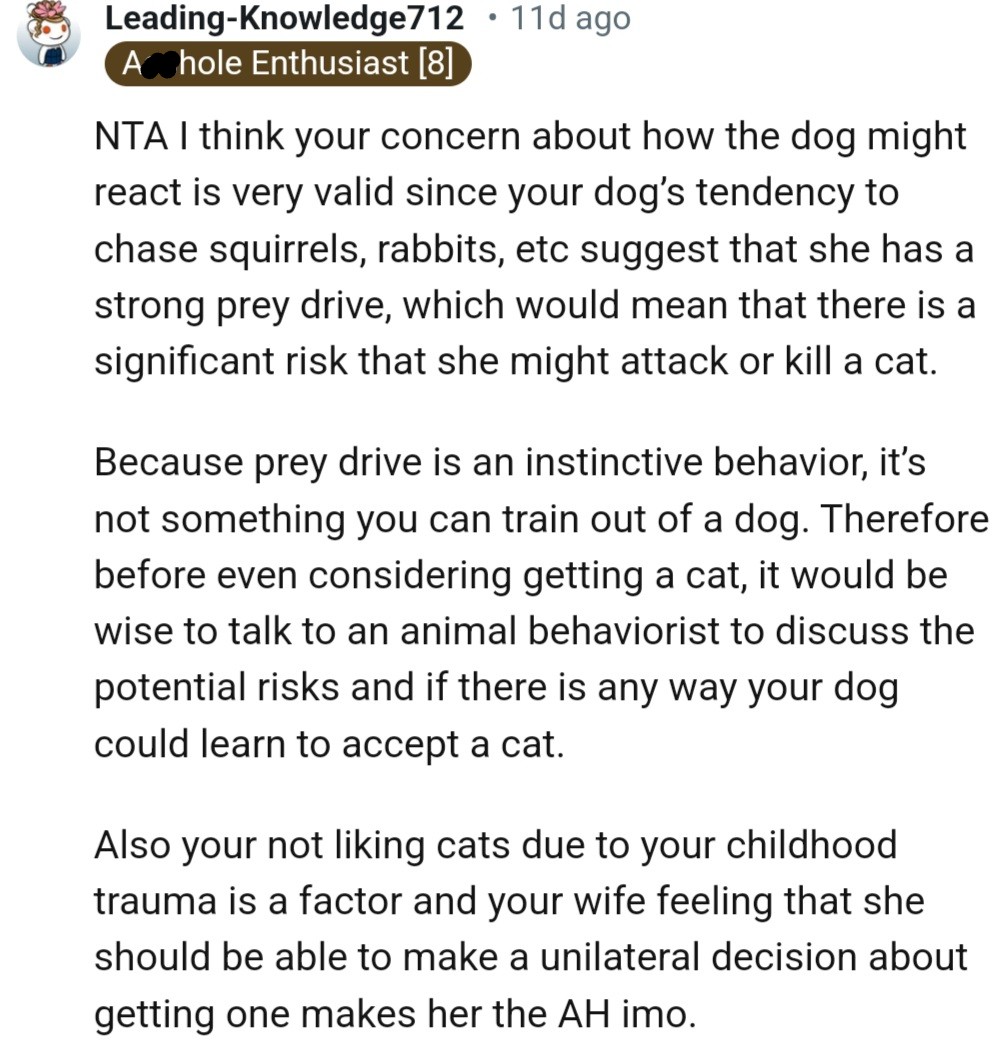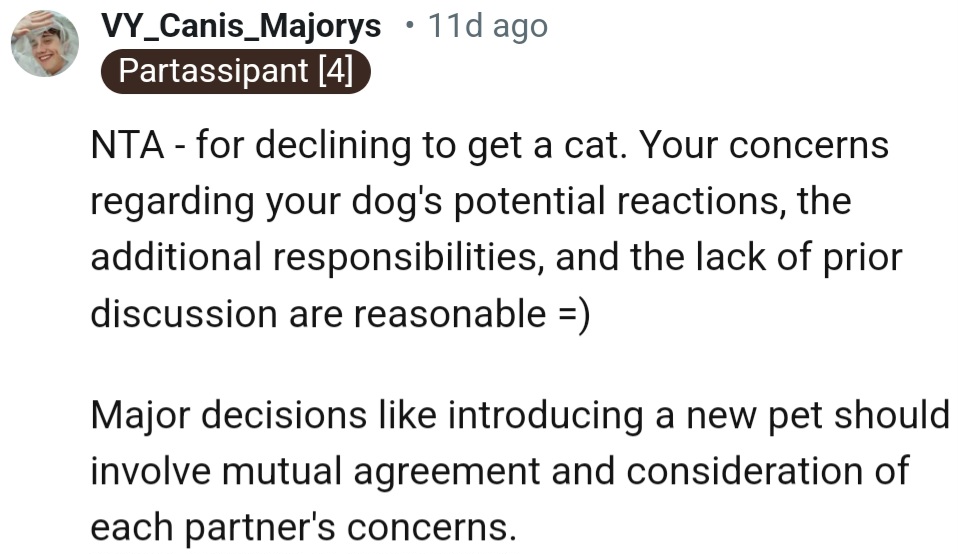Redditor Firmly Opposes Wife’s Decision To Adopt A Cat Due To Their Childhood Trauma
Cats are the epitome of adorable mischief and elegance. They prance around, purr, and bat their eyes like furry divas. But let’s be real—while they might be irresistibly cute, they’re not everyone’s cup of tea.
Some folks prefer their pets without a side of fur-induced chaos, and our narrator (Original Poster) is one of them. Ever since OP was attacked by one as a young child, they had never been a fan.
To set the record straight, OP wasn’t afraid of them—just filled with pure, unadulterated dislike. Their wife, on the other hand, adored cats.
The couple currently shares their home with a 2.5-year-old Australian cattle dog who loves to chase anything that moves: squirrels, rabbits, people on bikes—it’s all part of her herding instincts.
So, imagine OP’s surprise when their wife went to a pet store with her aunt and came back smitten by a cat. She fell head over heels for this furry feline and announced that they simply had to bring it home. OP, however, was not on board.
First, they had concerns about how the dog would react. Would she see the cat as something to herd or chase? Then, there was the practical side—how do they stop the dog from gobbling up the cat food? Or worse—getting into the litter box?
Let’s not forget the added responsibility. Since OP mainly works from home, it would undoubtedly fall on them. It wasn’t fair for their wife to arrive home cat-struck and expect them to make this significant life change on the spot. They just weren’t ready for that kind of commitment.
Was OP the AH for putting their foot down and saying no to a new cat?
Let’s dig into the details

Here's the overview of the story

Childhood Trauma and Its Long-lasting Effects
Dr. Sarah Mitchell, a developmental psychologist, highlights that childhood experiences significantly shape our adult relationships.
Her research indicates that negative interactions with animals during formative years can lead to generalized fears and aversions later in life.
Understanding how these early experiences affect current perceptions is crucial for personal growth and healing.
OP's wife brought home a cat without asking, but OP has doubts due to their dog's potential reaction and the added workload.

Check out some interesting comments we've gathered from the Reddit Community;

Studies show that unresolved trauma can manifest in various ways, including avoidance and anxiety around specific triggers, such as animals.
It's essential for individuals with such backgrounds to recognize these patterns and explore therapeutic avenues, like cognitive-behavioral therapy (CBT), to address their fears constructively.
CBT has been shown to effectively reduce anxiety associated with specific phobias by reframing negative thought patterns.
"You are not wrong to want a cat"

"You should tell her that you hate cats and don't want one in the house"

The Importance of Communication in Relationships
In relationships, open communication is fundamental, especially when one partner has a trauma history.
Experts suggest that discussing fears and anxieties openly can facilitate understanding and empathy, allowing both partners to navigate the situation with greater compassion.
This approach can also foster a sense of safety, enabling the individual to gradually confront their fears in a supportive environment.
"I think your concern about how the dog might react is very valid"

"Saying it's unfair that she went to a pet store without warning is a bit much"

Moreover, relationship counseling can provide a structured space for partners to address these sensitive topics.
Research indicates that couples who engage in therapy often report improved communication and understanding, which can help mitigate the impact of trauma on their relationship.
By working together, couples can develop strategies to create a more balanced and supportive dynamic.
"We just got a cat a few months ago"

"Your dog should be trained properly and not be running loose"

While OP’s wife’s desire for a cat wasn’t wrong, Redditors agreed that their concerns were also valid. Relationships are about compromise, so it’s crucial to talk it through and find a solution that works for both of them.
A fellow victim of an animal attack reminded OP that there are plenty of sweet-natured felines that could charm even the socks off the most cat-averse among us. Their advice? Keep an open mind, OP, as you work things out!
We’d love to get your thoughts on this story. Join the conversation in the comments.
"The dog and the cat could hate you or the cat could chill and fit right"

"Major decisions like introducing a new pet should involve mutual agreement"

Practical Steps for Healing from Trauma
Practicing self-compassion and mindfulness can also be beneficial for individuals dealing with trauma-related anxiety.
Mindfulness techniques, such as deep breathing and meditation, have been shown to reduce anxiety and foster a sense of calm.
Incorporating these practices can help individuals manage their fears surrounding animals and build resilience over time.
Psychological Analysis
This situation is a clear example of how childhood traumas can shape adult behaviors and relationship dynamics.
It’s essential for partners to approach these discussions with empathy and understanding to foster healing.
Analysis generated by AI
Analysis & Alternative Approaches
Understanding the intricate relationship between childhood experiences and adult behaviors is essential for personal growth.
Research supports that healing from trauma is possible through therapy, communication, and self-care practices.
As noted by trauma specialists, acknowledging and addressing these fears can lead to healthier, more fulfilling relationships.



